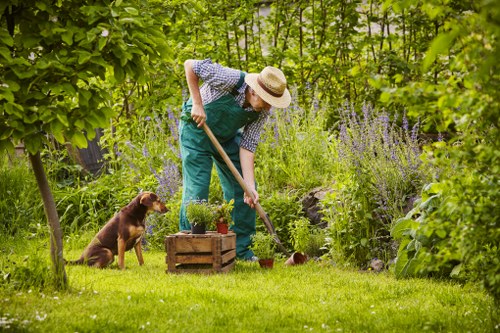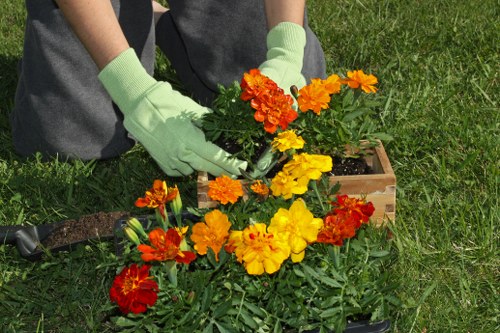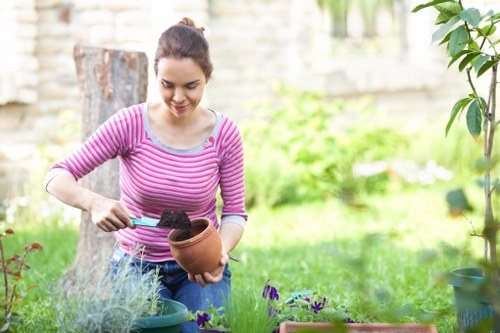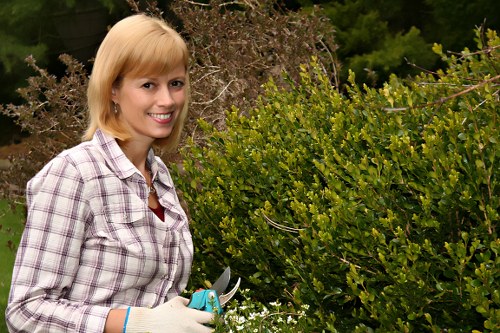Garden Maintenance in Granville
Introduction to Garden Maintenance

Maintaining a beautiful garden in Granville requires dedication, knowledge, and the right set of tools. Whether you're a seasoned gardener or a beginner, understanding the essentials of garden maintenance can transform your outdoor space into a vibrant and inviting haven.
In this comprehensive guide, we'll explore the various aspects of garden maintenance specific to Granville's climate and soil conditions. From seasonal planting to pest management, we've got you covered.
Let's delve into the key elements that ensure your garden thrives all year round.
Understanding Granville's Climate and Soil

Granville boasts a diverse climate that influences the types of plants that can flourish here. Typically characterized by mild winters and warm summers, the region provides an ideal environment for a wide range of flora.
The soil in Granville varies, with some areas featuring sandy soils while others have more clay-based compositions. Testing your soil's pH and nutrient levels is crucial for selecting the right plants and amendments.
By tailoring your garden maintenance practices to Granville's specific environmental conditions, you can ensure optimal plant health and growth.
Seasonal Gardening Tips

Spring Maintenance
Spring is the perfect time to prepare your garden for the growing season. Start by clearing out any debris left from the winter months and inspecting your plants for signs of disease or damage.
Planting spring-blooming flowers like tulips and daffodils can add vibrant colors to your garden. Additionally, fertilizing your lawn and garden beds will provide the necessary nutrients for robust growth.
Don't forget to prune shrubs and trees to promote healthy development and prevent overcrowding.
Summer Care
With the arrival of summer, consistent watering becomes paramount. Early morning is the best time to water your plants to minimize evaporation and fungal growth.
Regular weeding helps reduce competition for nutrients and water, ensuring your plants remain healthy and vibrant.
Consider installing a drip irrigation system to maintain efficient water usage throughout the hot months.
Pest and Disease Management

Pests and diseases can quickly derail your garden maintenance efforts. Identifying common garden pests in Granville, such as aphids, caterpillars, and snails, is the first step in effective management.
Implementing natural pest control methods, like introducing beneficial insects or using organic sprays, can help keep pest populations in check without harming the environment.
Regularly inspect your plants for signs of disease, such as discoloration or wilting, and address issues promptly to prevent spread.
Pruning and Trimming Techniques

Why Pruning is Essential
Pruning is a critical aspect of garden maintenance that promotes healthy plant growth and enhances the overall appearance of your garden.
Proper pruning techniques can help prevent diseases, improve air circulation, and encourage fruit production in fruit-bearing plants.
Always use clean, sharp tools to make precise cuts and reduce the risk of damaging your plants.
When to Prune
The timing of pruning varies depending on the plant species. Generally, late winter or early spring is ideal for most trees and shrubs, allowing them to recover before the growing season begins.
Flowering plants may require pruning after they have finished blooming to encourage new growth.
Research specific pruning needs for each plant in your garden to ensure optimal results.
Soil Health and Fertilization
Testing and Amending Soil
Healthy soil is the foundation of a thriving garden. Regular soil testing helps you understand the nutrient composition and pH levels, enabling you to make informed decisions about amendments.
Adding organic matter, such as compost or well-rotted manure, can improve soil structure, increase fertility, and enhance moisture retention.
Adjusting the pH level with lime or sulfur ensures that plants can effectively absorb nutrients.
Choosing the Right Fertilizer
Selecting an appropriate fertilizer depends on the specific needs of your plants and the results of your soil tests. Balanced fertilizers with equal parts nitrogen, phosphorus, and potassium are suitable for general use.
For flowering plants, fertilizers higher in phosphorus can promote blooming, while leafy vegetables benefit from higher nitrogen levels.
Always follow the manufacturer's instructions to avoid over-fertilization, which can harm plants and the environment.
Lawn Care and Maintenance
Mowing and Trimming
Maintaining a healthy lawn requires regular mowing and trimming. Set your mower to the appropriate height for your grass type to encourage strong root development and reduce weed growth.
Leaving grass clippings on the lawn can return valuable nutrients to the soil, promoting lush growth.
Avoid cutting more than one-third of the grass height at a time to prevent stress and damage.
Weed Control
- Identify common lawn weeds in Granville, such as dandelions, crabgrass, and clover.
- Use pre-emergent and post-emergent herbicides to manage weed populations.
- Employ manual removal techniques for smaller infestations.
Fertilization and Aeration
Fertilizing your lawn in the spring and fall provides essential nutrients that support healthy growth.
Aerating the soil annually helps alleviate compaction, allowing air, water, and nutrients to reach the grassroots effectively.
Core aerators are ideal for removing plugs of soil without disrupting the lawn's surface.
Plant Selection for Granville Gardens
Perennials and Annuals
Choosing the right plants is crucial for a sustainable garden. In Granville, both perennials and annuals can thrive when selected appropriately.
- Perennials: Lavender, salvia, and echinacea are excellent choices that provide long-lasting beauty and require minimal maintenance.
- Annuals: Petunias, marigolds, and zinnias offer vibrant colors and can be rotated each season to keep the garden dynamic.
Native Plants
Incorporating native plants into your garden supports local biodiversity and reduces maintenance needs. Native species are well-adapted to Granville's climate, making them more resilient against pests and diseases.
Consider planting:
- Australian bottlebrush
- Grevillea
- Callistemon
- Acacia
- Hardenbergia
Irrigation Systems
Choosing the Right System
An efficient irrigation system is vital for consistent garden maintenance. Watering your plants effectively conserves resources and ensures that each plant receives the necessary hydration.
- Drip Irrigation: Delivers water directly to the plant roots, reducing evaporation and water waste.
- Splash Systems: Suitable for lawns and larger garden areas but may lead to higher water usage.
- Smart Controllers: Automate watering schedules based on weather conditions, optimizing water efficiency.
Maintenance Tips
Regularly check for leaks or clogs in your irrigation system to maintain optimal performance.
Adjust watering schedules during different seasons to accommodate varying plant needs and weather patterns.
Consider using rain sensors to prevent overwatering during rainy periods.
Mulching for Moisture and Weed Control
Benefits of Mulching
Mulching is a simple yet effective garden maintenance practice that offers numerous benefits. It helps retain soil moisture, suppresses weed growth, and regulates soil temperature.
Organic mulches, such as wood chips, straw, and compost, enrich the soil as they decompose, providing additional nutrients to your plants.
Inorganic mulches, like gravel or plastic sheeting, offer long-term weed suppression and low maintenance but do not improve soil fertility.
Application Techniques
Apply mulch in a layer 2-3 inches thick around your plants, ensuring it does not directly contact the plant stems to prevent rot.
Replenish mulch as needed throughout the year to maintain its effectiveness.
Use mulch to create defined garden beds and pathways, enhancing the overall landscape design.
Pruning and Deadheading
Maintaining Flowering Plants
Regular pruning and deadheading are essential for promoting continuous blooming and maintaining plant health.
Remove spent flowers and dead branches to encourage new growth and prevent the spread of diseases.
Pruning also helps shape plants, enhancing their aesthetic appeal and ensuring they do not become overgrown.
Techniques for Effective Pruning
- Use sharp, clean tools to make precise cuts.
- Prune at the right time of year for each plant species.
- Remove no more than one-third of the plant's growth at a time to avoid stress.
Composting and Soil Enrichment
Benefits of Composting
Composting is an eco-friendly way to recycle garden waste and kitchen scraps, turning them into nutrient-rich soil amendments.
Adding compost to your garden enhances soil structure, improves moisture retention, and provides essential nutrients for plant growth.
Composting also reduces the need for chemical fertilizers, promoting a healthier and more sustainable garden environment.
How to Start Composting
- Choose a compost bin or designate a composting area in your garden.
- Combine green materials (kitchen scraps, fresh grass clippings) with brown materials (dry leaves, straw).
- Turn the compost regularly to aerate and accelerate decomposition.
- Monitor moisture levels, keeping the pile damp but not soggy.
- Harvest finished compost after several months for use in your garden beds.
Local Gardening Resources in Granville
Gardening Clubs and Workshops
Engaging with local gardening clubs and attending workshops can enhance your garden maintenance skills. These communities offer valuable resources, advice, and support from fellow gardening enthusiasts.
Participate in seasonal events and plant exchanges to diversify your garden and stay updated on the latest gardening trends.
Local Nurseries and Suppliers
Granville is home to several nurseries and gardening suppliers that provide a wide range of plants, tools, and materials to support your garden maintenance efforts.
- Granville Garden Centre
- Green Haven Nurseries
- Urban Blooms Supply
- EcoGrow Solutions
- Floral Fantasy Shops
10-15 Closest Areas to Granville for Gardening Services
Granville is surrounded by several neighborhoods and suburbs that also benefit from top-notch garden maintenance services. Here are the closest areas where you can find exceptional gardening support:
- Pomona: Located just north of Granville, Pomona offers a range of gardening services tailored to both residential and commercial clients.
- Bull Creek: Known for its lush landscapes, Bull Creek is home to numerous expert gardeners and maintenance professionals.
- Naval Base: This area provides specialized garden maintenance services, especially for government and institutional properties.
- Shallowdene: With its diverse plant life, Shallowdene residents have access to premium gardening solutions.
- Leonard: Leonard is a vibrant community with several local gardeners offering personalized maintenance plans.
- Adelaide Park: Adelaide Park is renowned for its community gardens and skilled maintenance teams.
- Gepps Cross: This suburb features a mix of commercial and residential gardening services to meet varied needs.
- Stirling: Stirling's green spaces are well-maintained by dedicated local gardeners and landscaping experts.
- Northcote: Northcote offers innovative garden maintenance services, focusing on sustainable and eco-friendly practices.
- Oaklands Park: Oaklands Park residents benefit from comprehensive garden care, including pruning, weeding, and fertilization.
- Demers Grove: Demers Grove is a hotspot for gardening enthusiasts seeking professional maintenance and landscaping services.
- Campbelltown: Just a short drive from Granville, Campbelltown offers extensive gardening support and resources.
- West Footscray: West Footscray's diverse community enjoys access to a variety of garden maintenance options.
- Avondale: Avondale is home to several reputable gardening companies specializing in both ornamental and practical garden care.
- Kings Park: Kings Park features well-maintained gardens thanks to skilled local gardeners and regular maintenance schedules.
These nearby areas complement Granville by providing additional resources and expertise, ensuring that residents have access to the best garden maintenance services available.
Eco-Friendly Garden Maintenance Practices
Sustainable Gardening Techniques
Adopting eco-friendly practices in your garden maintenance not only benefits the environment but also enhances the health and resilience of your plants.
- Water Conservation: Implement drought-resistant plants and efficient irrigation systems to reduce water usage.
- Organic Fertilizers: Use compost and organic mulches to enrich the soil naturally.
- Integrated Pest Management: Combine biological, cultural, and mechanical methods to control pests without relying on chemical pesticides.
- Native Plant Selection: Choose native species that are adapted to the local climate and require less maintenance.
Reducing Chemical Usage
Minimizing the use of synthetic chemicals in your garden promotes a healthier ecosystem. Opt for natural alternatives like neem oil, insecticidal soaps, and organic fungicides to manage pests and diseases.
Encourage beneficial insects, such as ladybugs and bees, by planting a variety of flowering plants that provide nectar and habitat.
Practice crop rotation and companion planting to naturally deter pests and improve soil health.
Tools and Equipment for Effective Garden Maintenance
Essential Gardening Tools
Having the right tools makes garden maintenance more efficient and enjoyable. Invest in high-quality equipment that suits your gardening needs.
- Pruning Shears: For precise cutting of branches and stems.
- Garden Fork: Ideal for aerating soil and turning compost.
- Shovels and Spades: Essential for digging and planting.
- Rakes: Useful for leveling soil and gathering leaves.
- Hose and Sprinkler Systems: Ensure consistent watering across your garden.
Advanced Gardening Equipment
For larger gardens or more intensive maintenance, consider investing in advanced tools:
- Lawn Mowers: Select from push, electric, or gas-powered mowers based on your lawn size and preferences.
- String Trimmers: Maintain edges and tight spaces with ease.
- Leaf Blowers: Quickly clear leaves and debris from hard-to-reach areas.
- Wheelbarrows: Transport soil, plants, and tools efficiently.
- Garden Tillers: Prepare large areas of soil for planting and cultivation.
Maintenance of Tools
Proper maintenance of your gardening tools ensures their longevity and performance:
- Clean tools after each use to prevent rust and contamination.
- Sharpen blades regularly for optimal cutting efficiency.
- Store tools in a dry, protected area to extend their lifespan.
- Replace worn or damaged parts promptly to maintain functionality.
Creating a Garden Maintenance Schedule
Year-Round Maintenance Plan
Establishing a garden maintenance schedule helps you stay organized and ensures all aspects of your garden receive the attention they need.
- Spring: Clean up, plant new flowers, fertilize, and prune.
- Summer: Water regularly, mulch, control weeds, and manage pests.
- Autumn: Rake leaves, plant bulbs for next spring, and prepare perennials.
- Winter: Protect plants from frost, plan garden layouts, and maintain tools.
Daily and Weekly Tasks
In addition to seasonal tasks, incorporating daily and weekly maintenance activities ensures your garden remains in top condition:
- Daily: Check for pests, monitor plant health, and ensure irrigation systems are functioning.
- Weekly: Mow the lawn, trim plants, and apply fertilizers or pest treatments as needed.
Tracking Progress
Use a garden journal or digital tool to track your maintenance activities, plant growth, and any issues that arise. This practice helps you identify patterns and make informed decisions for future gardening endeavors.
Regularly reviewing your maintenance schedule allows for adjustments based on seasonal changes and specific garden needs.
Professional Garden Maintenance Services in Granville
Benefits of Hiring Professionals
While DIY garden maintenance can be rewarding, hiring professional services in Granville offers several advantages:
- Expertise: Professionals possess the knowledge and experience to address complex gardening challenges.
- Time-Saving: Outsourcing maintenance tasks frees up your time for other activities.
- Customized Services: Tailored maintenance plans meet the specific needs of your garden.
- Access to Quality Resources: Professionals use high-quality tools and materials to ensure optimal results.
Choosing the Right Service
Select a garden maintenance service that aligns with your goals and budget. Consider factors such as:
- Reputation and reviews
- Range of services offered
- Pricing and packages
- Availability and scheduling flexibility
- Certifications and qualifications
Contact Us Today
Ready to elevate your garden maintenance in Granville? Contact us today to discuss your gardening needs and schedule a consultation with our expert team. Transform your outdoor space into a stunning masterpiece with our professional services.
Conclusion
Effective garden maintenance in Granville involves a combination of understanding the local climate, selecting the right plants, and implementing sustainable practices. Whether you're tending to a small backyard garden or managing a large landscape, these strategies will help you achieve a lush and thriving outdoor space.
Remember to stay proactive with your maintenance schedule, utilize available resources, and don't hesitate to seek professional assistance when needed. With dedication and the right approach, your Granville garden can flourish year-round.
Book your service now and take the first step towards a more beautiful and healthy garden!
